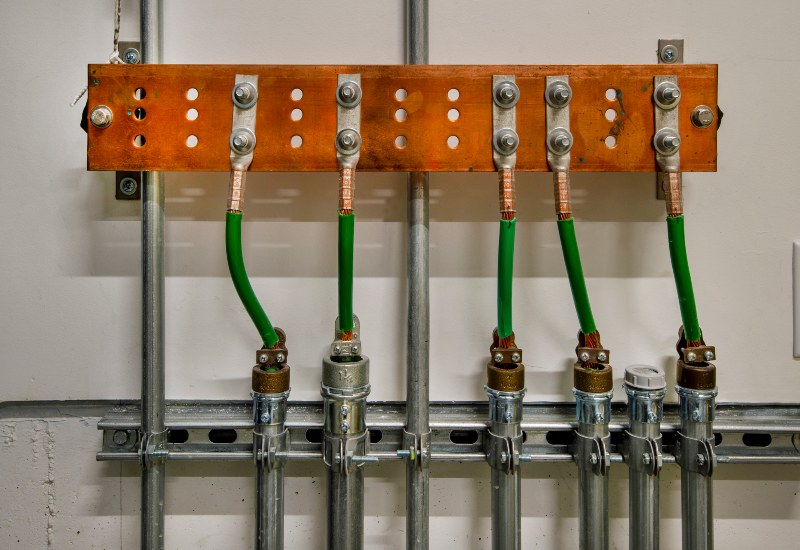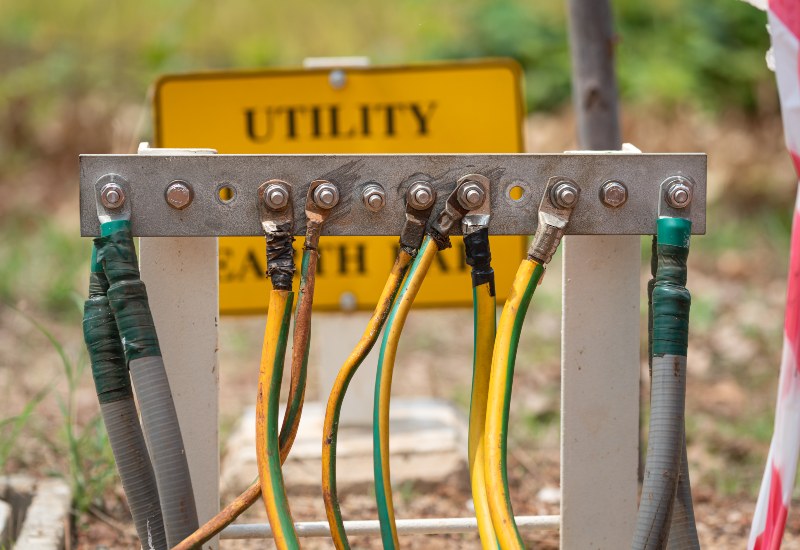Electricity powers modern life, but it also carries risks when it’s out of control. Every time you plug in a lamp, charge your phone, or use your oven, electricity flows through wires at high speed. While those wires are designed to guide power where it belongs, sometimes electricity takes an unexpected detour. That’s where electrical grounding comes in.

What Is Electrical Grounding?
Grounding is a built-in safety feature that protects your home, family, and electronics from electrical hazards. It connects part of your home’s electrical system to the earth, which gives stray or excess electricity a safe place to go instead of running through your appliances, your wiring, or your body.
Under normal conditions, electricity follows the wires, powering devices and light fixtures. But when something abnormal happens—like a surge from lightning, an overloaded circuit, or a faulty appliance—a grounding wire carries extra current into a metal rod or plate buried outside. The earth, being a natural conductor, absorbs the current instantly. You never see this process in action, but it’s always working in the background to keep you safe.
Why Is Electrical Grounding Important?
Grounding keeps your electrical system safe, stable, and reliable. Here are the benefits of electrical grounding:
- Protection from electrical shocks: If an appliance malfunctions or a wire becomes loose, stray current can make its way onto the surfaces you touch. A grounding system redirects that current into the earth, keeping it away from people and reducing the chance of electrocution.
- Lower risk of electrical fires: Faulty wiring or sudden surges can cause sparks that ignite insulation or other nearby materials. Grounding safely channels that energy out of your system before it can overheat wires or cause a fire.
- Extended lifespan for electronics: Many gadgets and kitchen appliances are sensitive to sudden changes in voltage. A grounded system shields against surges, helping them last longer and preventing premature replacements.
- Stable electrical performance: Without grounding, voltage can fluctuate in unpredictable ways. This instability can cause lights to flicker, appliances to perform poorly, or sensitive electronics to malfunction. Grounding balances your electrical system, so everything runs more reliably.
- Peace of mind: Knowing your electrical system has this built-in safety feature gives you confidence that your home is protected from common electrical hazards. It’s a simple way to safeguard your household and secure your investment.
What Are the Types of Electrical Grounding?
Not all types of grounding use the same setup, but they all rely on a basic principle: give electricity a safe path into the earth. A professional can determine which setup your home already has and whether it needs upgrading.
Here are the components used in the most common types of grounding systems:
- Earth grounding: This is the most common method for homes. It uses a grounding electrode—usually a metal rod or plate buried in the soil—connected by a grounding conductor in the form of a wire. Excess current flows from the wire to the rod or plate, where electricity disperses harmlessly into the earth.
- Equipment grounding: This method connects appliances and other devices directly to the grounding system. It uses bonding connections and the grounding bus bar inside the electrical panel to ensure any stray current moves into the earth instead of running through the appliance casing or metal surfaces.
- Neutral grounding: Often used in larger systems, this ties the neutral wire of the electrical supply to the ground. It relies on the bus bar and conductor connections to stabilize voltage and keep the system balanced, which helps prevent overloads.

What Are the Signs of Poor or Missing Grounding?
Grounding is easy to take for granted because you can’t see it working. However, if your home lacks proper grounding, or the existing system has worn out, you may notice certain signs. For example:
- Two-prong outlets: Older outlets with only two slots are an immediate giveaway. No third slot means no grounding connection.
- Frequent tripped breakers or blown fuses: If your circuit breakers trip often, your system may be struggling to handle extra current. Poor grounding makes the system less effective at redirecting surges, leaving your home, family, and electronics at risk.
- Flickering lights when appliances turn on: When grounding isn’t adequate, appliances that draw heavy current may cause the lights to dim or flicker. This points to an unstable electrical system that isn’t distributing power evenly.
- Small shocks or tingling from metal appliances: If you feel a mild shock when touching appliances like a washer, dryer, or refrigerator, stray current is likely flowing through the metal instead of being redirected safely into the ground.
- Unexplained damage to electronics: Computers, TVs, and other sensitive devices may fail prematurely if exposed to power surges. A weak or missing grounding system leaves them unprotected.
- Your home’s age: Houses built before the 1960s often lack grounding systems or have outdated installations that no longer meet code. If your home hasn’t been rewired or inspected in decades, it’s worth checking whether the grounding system is up to modern standards.
How Can You Ensure Proper Grounding?
Maintaining proper grounding is a simple way to protect your home’s electrical network. Here’s how to make sure your system is grounded correctly:
- Schedule an electrical safety inspection, especially if you live in an older home without built-in grounding.
- Upgrade two-prong outlets with three-prong grounded outlets.
- Install whole-home surge protection for the best defense against electricity spikes.
Call Us for Grounding Electrical Rewiring
Brighter Days Electric is proud to be a trusted local electrical partner for homeowners on the Treasure Coast. We have decades of experience offering honest pricing and stress-free electrical services. Our family-owned business is operated by a husband-and-wife team who provide personalized services based on your budget, requirements, and schedule. If your home in Port St. Lucie, Indian River, or Martin County needs grounding electrical rewiring or a safety inspection, please schedule services with us today.

